We must secure the existence of our security clearance
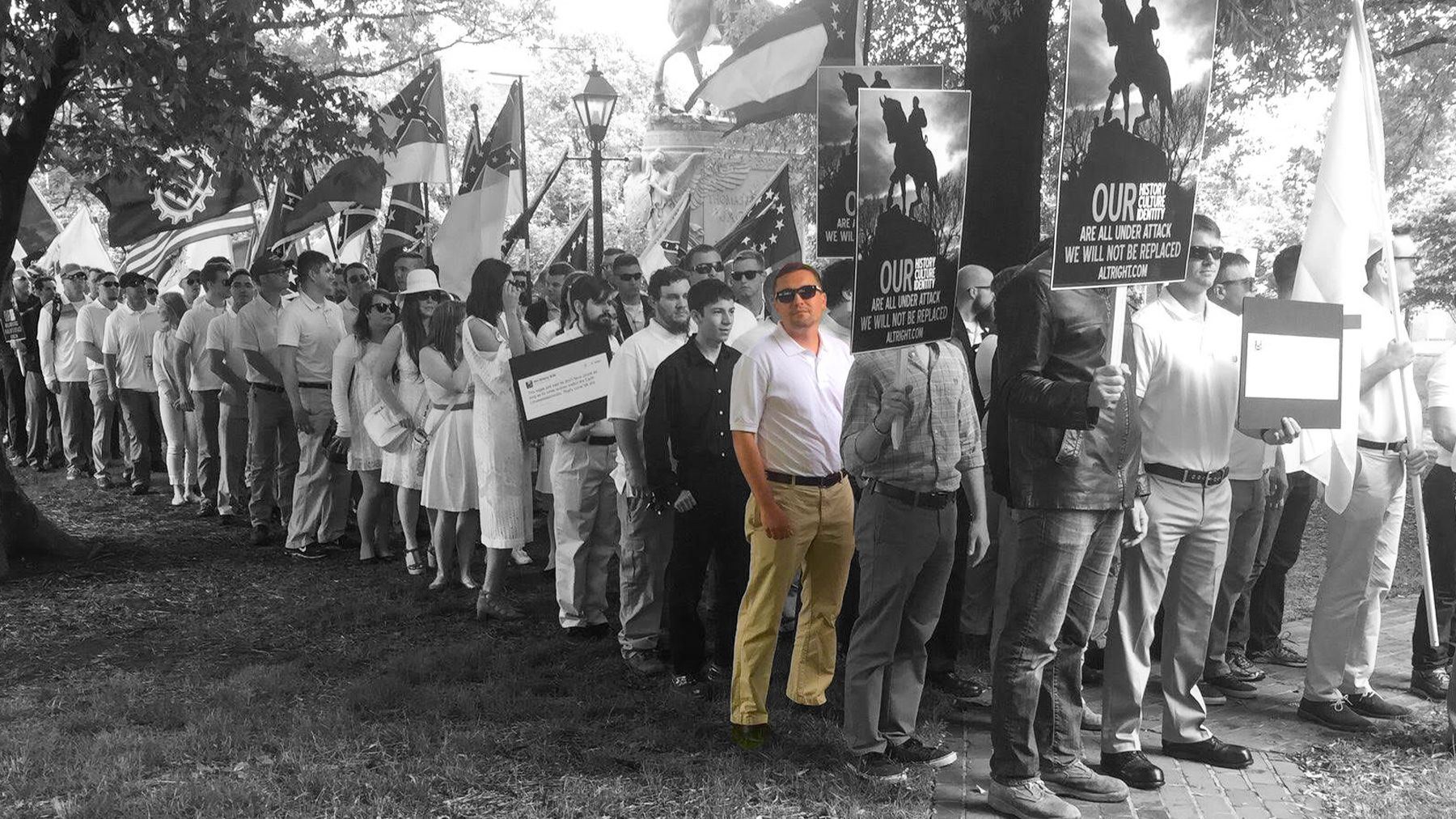
May god grant me the confidence of a man who takes the time out of his busy schedule of making nazi podcasts to file suit against the State Department. Matthew Gebert, known in online extremist circles by his pseudonym "Coach Finstock," claims his first amendment rights were violated when his employer, the US Department of State, revoked his Top Secret security clearance. According to his complaint, he has remained on unpaid leave ever since, as he cannot perform his job duties without an active security clearance.
When Michael Edison Hayden reported for Hatewatch in August 2019 that the nazi podcaster known as "Coach Finstock" was a US State Department employee named Matthew Quinn Gebert, Gebert was suspended pending an investigation. Hayden's reporting, over a series of pieces, laid out a damning history of years of white nationalist organizing, activism, and propaganda. Throughout 2017, in the lead up to the deadly Unite the Right rally in Charlottesville (which he attended in disguise), Gebert's Loudoun County, Virginia home was a frequent gathering place for other movement leaders. His wife Anna even baked swastika-shaped cookies for guests. His own brother submitted an online tip to the FBI in July of 2019, telling Hatewatch that “I saw so much evil in my brother," he felt he had to report him.

In the wake of his suspension, Gebert remained active in the movement and kept podcasting. He sold his house in Loudoun for $640,000 and his family moved to Purgittsville, WV. The State Department was predictably tight lipped about the status of his employment. Though it seemed clear he was suspended, there was some speculation that he remained on the payroll. Gebert's own lawsuit was the first confirmation that he has been on unpaid leave since his suspension in August 2019.
The government's motion to dismiss the lawsuit further elaborates - Gebert's security clearance was suspended pending an investigation on August 16, 2019 and revoked on July 1, 2020. As a foreign affairs officer, Gebert's duties required an active Top Secret security clearance. When his clearance was suspended, the Bureau of Human Resources suspended him without pay for a "failure to maintain a condition of employment."
During the interview, Gebert was asked the following questions, which are routinely asked of employees and applicants as matter of standard operating procedures: (1) “Whether he had any association with any person, group, or business venture that could be used, even unfairly, to criticize, impugn or attack his character or qualifications for a government position;” (2) “Whether he was aware of any people or organizations that would criticize or oppose his employment in a government position;” (3) “if there was any information regarding members of his family that would be a possible source of embarrassment to the United States Department of State.” Gebert answered each question in the negative.
- Defendant's Motion to Dismiss
In the months immediately preceding the publication of the Hatewatch article, Gebert had successfully completed a routine background reinvestigation to maintain his clearance. In the course of that reinvestigation, Gebert failed to disclose and actively denied any association with any person, group, or business venture that could be used to impugn his character or be a source of embarrassment to his employer.
Based on the government's motion, Gebert's security clearance was not revoked because he is a white supremacist, but because he was dishonest about being a white supremacist. It may sound like a distinction without a difference, but it's a fatal blow to the complaint. You may have a first amendment right to take holocaust denier David Irving out for a nice dinner (as Gebert and his wife did in 2017), but there's no first amendment right to lie during your security clearance background investigation. In fact, you have very few rights at all when it comes to the government's ability to deny or revoke a clearance.
As to his constitutional claims, Gebert’s First Amendment claims fail because, as his own pleadings demonstrate, the Department revoked his security clearance due to his dishonesty, rather than his extensive white nationalist activities and associations
- Defendant's Motion to Dismiss
I won't bore you with too many details of the relevant caselaw here - the table of authorities on the government's motion to dismiss is twelve pages long. There are no shortage of cases involving a revoked or denied security clearance. The long and the short of it is: a security clearance is a privilege, not a right. You do not have a right to get or keep a security clearance. Citing a 1988 Supreme Court decision, Department of Navy v Egan, "It should be obvious that no one has a 'right' to a security clearance." Ultimately, the government's argument here is: you can huff and puff all you want, but at the end of the day, you lied. Lying to get or keep a security clearance is a security problem.
That Gebert disagrees with the reasoning used to revoke his clearance is hardly surprising. But while Gebert may dislike the Department’s reasons for revoking his clearance, he does not plausibly allege that the Department itself did not believe these reasons.
- Defendant's Motion to Dismiss
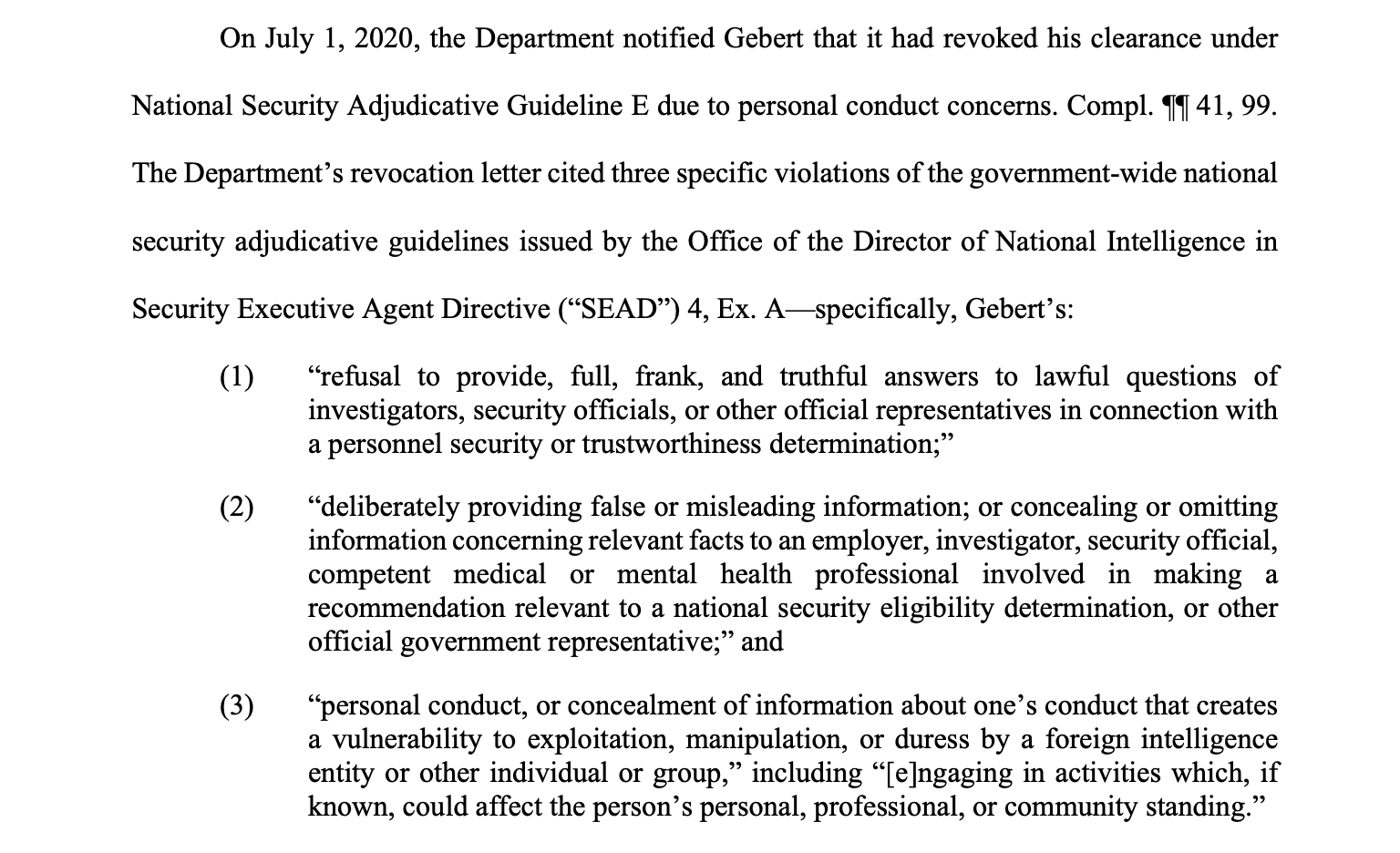
In an August 2017 episode of his podcast "The Fatherland," Gebert said “There are bigger things than a career and a paycheck, and I don’t want to lose mine." In his complaint, he argues that the government misinterpreted the statement,
[...]it is clear that what Plaintiff was saying is that his beliefs are more important to him than his job is. In other words, Plaintiff was saying that if he were ever forced to decide between his beliefs and his career, he would choose his beliefs. Thus, the statement itself negates the very point the Department of State previously alleged that it proved. It also clearly evidences that Plaintiff is proud of his beliefs, that he has integrity and conviction, and that he is not subject to blackmail on the basis of his beliefs.
- Gebert complaint ¶21
And while susceptibility to blackmail is a matter of concern in security clearance investigations, it is not the only concern. The government counters Gebert's assertion, citing Gebert's own words from podcasts and forum posts as well as his attempt to conceal his identity while attending white nationalist rallies like Unite the Right, concluding "the steps that Gebert took to avoid public identification as a white nationalist support the Department’s conclusion that Gebert had been dishonest about his extensive white nationalist activities and associations."
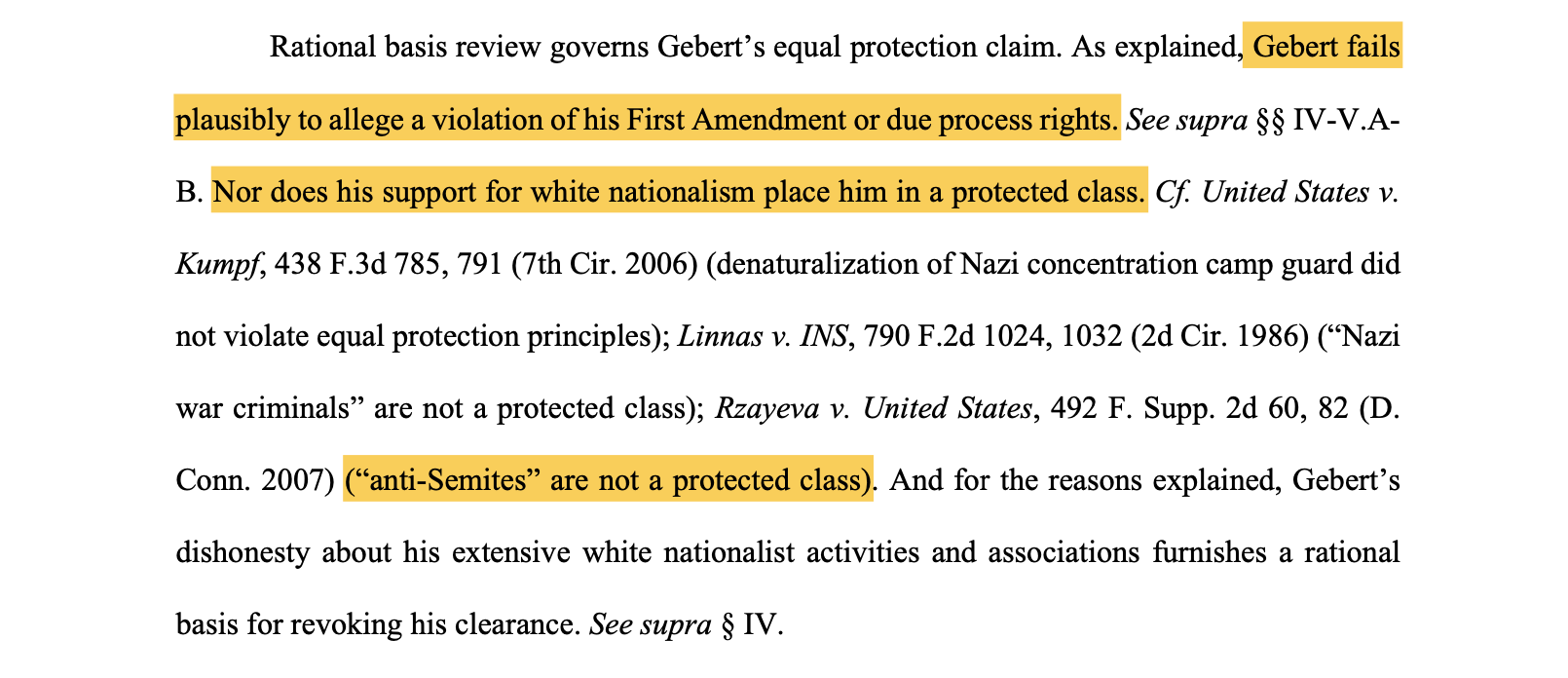
While the government generally leans on the fact that none of this matters anyway because the core issue was the dishonesty, even if the claims were to be considered for their merits, they fail. And the government doesn't just say 'being a white nationalist isn't a protected class' on vibes alone - there's actual caselaw, more of it than I expected. There really is nothing new under the sun and Gebert isn't the first anti-semite to ask the courts to consider that a protected class. We heard the arguments. We considered them. Time and time again, the courts have ruled that being a nazi doesn't make you a member of a protected class.
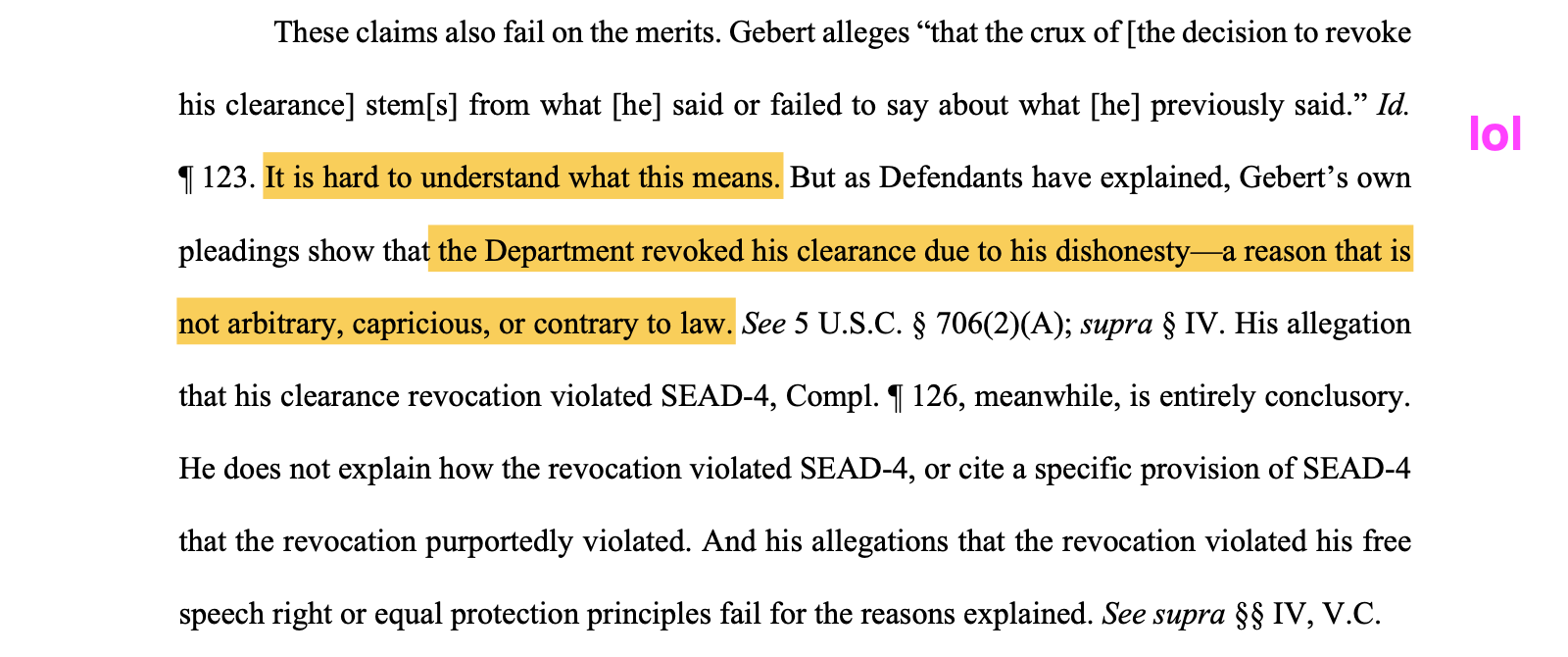
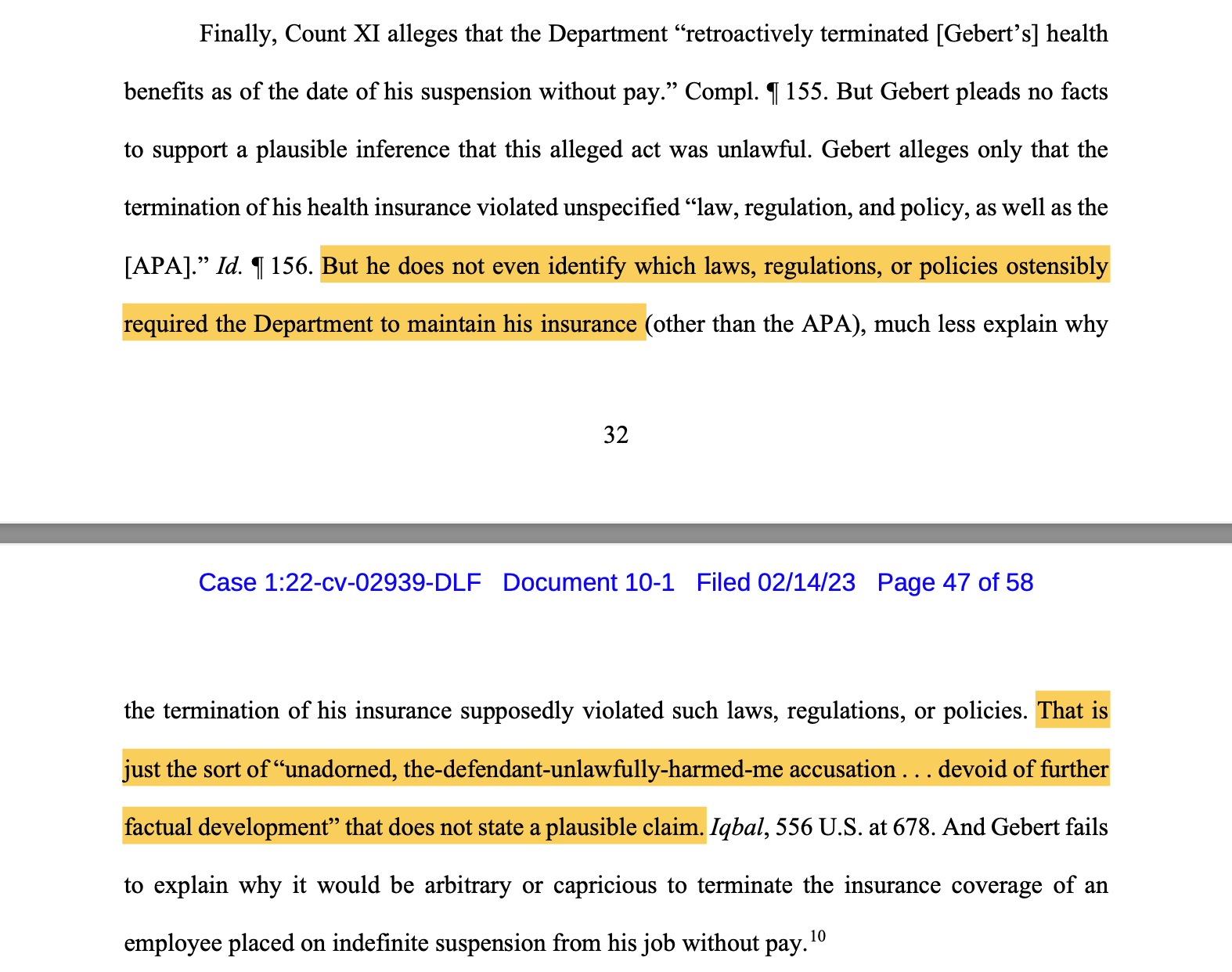
By the time we're getting into the mid-40s on the page count, the government's lawyer is getting wild with it, writing "it is hard to understand what this means" about a particularly vague line of the complaint and noting, with a biting tone I swear I can hear through the page, that "Gebert fails to explain why it would be arbitrary or capricious to terminate the insurance coverage of an employee placed on indefinite suspension from his job without pay."
Two weeks ago, Gebert filed an opposition to the government's motion to dismiss. The 55 page screed, curiously, continues to undercut his own case. Gebert contends that his suspension was a suppression of his free speech in response to the "significant negative media attention" after the Hatewatch article, citing the government's lack of such action after earlier articles about Gebert's campaign donations to right wing extremist political candidates like Paul Nehlen and Corey Stewart. The State Department's decision to revoke his clearance after the 2019 Hatewatch article but not after the 2018 article about his campaign donations only bolsters the government's claim that the revocation is not about Gebert's personal views or political speech, but about his dishonesty in the reinvestigation interviews.
Whether the State Department continued to monitor Gebert's online activities after his clearance was revoked in 2020 is unknown, but it would be reasonable to assume they checked back in on his podcast once the lawsuit was filed. In recent months, Gebert hosted Christopher "the crying nazi" Cantwell on an episode of Full Haus. At the time of the recording in January, Cantwell was fresh out of prison for making extortionate threats. While incarcerated at the Communications Management Unit at USP Marion, Cantwell befriended Russian arms dealer Viktor Bout. After Bout was returned to Russia in a high profile prisoner exchange for WNBA player Brittney Griner, he gave a shout out to his American friend Cantwell on a Russian radio show.

Since Cantwell's release, the Full Haus telegram channel has frequently shared Cantwell's content and fundraised for his living expenses. If Gebert had not already lost his security clearance, the government would probably have some questions to ask about his friendship with Cantwell, who recently hosted convicted Russian agent Maria Butina on his own podcast.
The government has until May 7 to file their response to Gebert's opposition to the motion to dismiss, at which point the judge will rule on the motion to dismiss. If the complaint survives the motion to dismiss, the government will file a response to the complaint itself (which, at this stage, they contend they simply do not have to as the case is without merit).
Gebert's attorney in this case is a man named Brett O'Brien, a founding member of National Security Law Firm. The firm's practice areas include security clearance denial appeals, courts martial defense, federal employment law, and TSA pre-check appeals. Not listed on O'Brien's website is a special interest in assisting service members in getting religious accommodations for vaccine refusal, though the firm is linked on a page of 'partnered law firms' by the right-wing nonprofit Christian Patriots United, run by bounty hunter/pastor Patrick Collis.
The case is ongoing, but I'm willing to bet Gebert doesn't walk away with the $150,000,000 he's asking for in the complaint.
